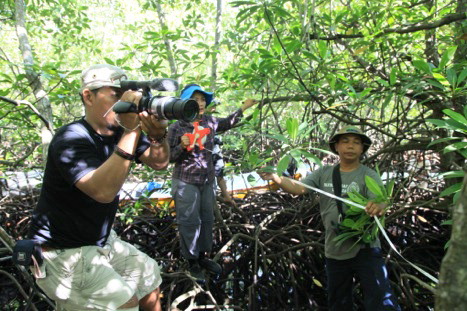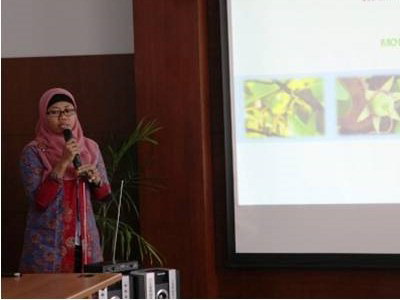These researchers established a mangrove monitoring station in Bali and collected data for two years, studying wetland vulnerability to sea level rise and the capacity of mangroves to store carbon. The team established a regional mangrove network with universities in five other countries beyond Indonesia (the United States, Australia, Singapore, Malaysia, and the Philippines) that use the same protocol for monitoring mangrove adaptation to sea level rise.
The PI and her colleagues published two papers, one on mangrove carbon sequestration and the other on sedimentation and mangrove growth rates, based on data collection undertaken as part of the PEER project. They also presented their results at several scientific meetings, both within Indonesia and internationally. The team also made two videos about mangroves and sea level rise, one aimed at a general audience of all ages and one for researchers, academics, and stakeholders. Two other key outputs resulted from the Evidence to Action supplement Dr. Sidik and her colleagues received in 2018. With those funds, they published a book of guidelines for creating a mangrove monitoring station, including a research summary of their work, and an illustrated guide to the Perancak Estuary in Bali.
During the project period, the team held a collaborative program to build mangrove research capacity, attended by 20 Indonesia researchers and academics from governmental institutions, NGO and universities. This convening event was also part of their Evidence to Action Supplement, which sought to build awareness among policy makers and coastal managers regarding the importance of mangroves to mitigate climate change and their adaptation to climate change.
The team convened other workshops and discussions to build capacity of researchers, practitioners, and academics on mangrove research and monitoring. The PI delivered lectures on mangroves and sea level rise to marine science students at Udayana University (Bali), Gadjah Mada University (Yogyakarta), and Brawijaya University (Malang). Another team member presented on mangrove remote sensing, exposing academics to new techniques for mangrove monitoring.
In order to move beyond the academic and policy sector and engage the local community in the effort to protect and value the mangrove ecosystem, Dr. Sidik and her team held a mangrove product training workshop in partnership with a local entrepreneur and the Mangrove Institute, to highlight the sustainable use of mangrove products for food and handicrafts (batik). This workshop helped identify alternative conservation activities that align with the PEER research. The grantees also held a small group discussion on their results and recommendations with national level policy makers focused on planning and climate adaptation, paired with a site visit to the mangrove monitoring station They also consulted with community organizations, Clungup Mangrove Conservation, Demang Gedi Mangrove Conservation and the Mangrove Institute for supporting information for their mangrove-related videos and policy recommendations. The team created a final working paper from this series of workshops.
Another outreach strategy involved the use of Instagram as a knowledge hub to provide mangrove-related information and activity updates. The PI and her team organized a Mangrove Vlog Competition for high school students in Jembrana Regency, Bali. This activity aimed to gain followers for the Instagram hub and to increase students’ awareness regarding mangrove conservation. All videos were uploaded to the team’s Instagram account “MangroveNet Bali,” attracting more than 1,000 people who voted for their favorite video.
The team and PI have been invited to be part of several international and national research proposals to further build knowledge around mangrove conservation and climate change adaptation.
PublicationsFrida Sidik, Nuryani Widagti, and Hanggar Prasetio Kadarisman. 2019.
Mangrove dan Perubahan Iklim: Panduan Stasium Monitoring Mangrove: Mengungkap peran ekosistem mangrove dalam adaptasi dan mitigasi perubahan iklim [Mangroves and Climate Change: Mangrove Monitoring Station Guide: Uncovering the role of mangrove ecosystems in climate change adaptation and mitigation]. Research and Marine Observation Center, Bali.
Frida Sidik, Maria Fernanda Adame, and Catherine E. Lovelock. 2019. Carbon sequestration and fluxes of restored mangroves in abandoned aquaculture ponds.
Journal of the Indian Ocean Region 15(2): 177–192.
https://doi.org/10.1080/19480881.2019.1605659 Frida Sidik, Nuryani Widagti, Abdul R. Zaky, Jejen J. Hidayat, Hanggar P. Kadarisman, and Fikrul Islamy. 2018.
Panduan Mangrove Estuari Perancak [Perancak Estuary Mangrove Guide]. Research and Marine Observation Center, Bali.
Frida Sidik, David Neil, and Catherine E. Lovelock. 2016. Effect of high sedimentation rates on surface sediment dynamics and mangrove growth in the Porong River, Indonesia.
Marine Pollution Bulletin 107(1): 355-363.
https://doi.org/10.1016/j.marpolbul.2016.02.048





